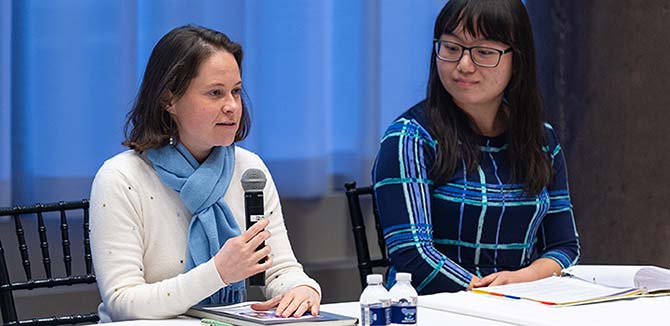Using What I Learned as One of MBP's First Graduates
Louisa Carr (MBP '05) talks about being a part of the inaugural MBP class and how her education helps her as an associate project manager at Regeneron Therapeutics.
When Louisa Carr (MBP '05) was pursuing her undergraduate degree in chemistry at Carleton College, she couldn't stand biology. Admittedly, she was only exposed to it in high school, but she thought it was boring — an alphabet soup of memorizations.
Her advisor encouraged Carr to take an introduction to biology course, if for nothing else than it would be of value if she decided to pursue a career in science. She listened and took the course in her senior year. Simply put, she was hooked. Carr heard about a new program launching at Northwestern University — the Master of Biotechnology program (MBP) — and decided to give it a try. She went on to become a graduate in the program's inaugural class.
Today, Carr is an associate project manager at Regeneron Pharmaceuticals in Rensselaer, New York, where she's worked since 2017. Earlier this year, Carr returned to campus as a panelist for the program's Biotech-Nexus event. She talked about her experiences in the program, how it helped her get where she is today, and what advice she would give to current and prospective students.
What interested you about MBP?
I didn't know what I wanted to do after college, but this program sounded like a perfect fit for me. It was technology and bio and engineering and chemistry all put together and coming together to be something, and that was really exciting to me. I figured it would be a good way to keep being a chemist, learn how to start being a biologist and get some engineering in there at the same time.
A lot of students weigh the decision of getting a PhD or going into industry work after MBP. How did you feel about that choice?
I knew I wanted an advanced degree, but going into the program, I decided I didn't want to do a PhD. My lab work was a good balance between engineering, chemistry and biology, and the research part of the program gave me a good immersion into academic research. Afterward, I decided I did want to do a PhD, which I got in chemical engineering from the University of Washington.
How do you use the knowledge you learned in MBP in your role at Regeneron?
I work in project management for departmental operations in a Process Sciences department. In that role, I need a scientific background to understand what the scientists need to support their daily work. I need the scientific and engineering backgrounds to understand what's going on on the manufacturing floor. I've used my chemistry background to tackle vendor-product variability. Project management is really about building our network across the company, not just across departments, and facilitating in order to get things done that need to be done.
What advice would you give to a current MBP student?
Getting exposure to business environments is very valuable. Today, MBP provides students with a variety of ways to connect with all types of businesses, but as the program was launching, there was not the same extent of opportunities. As a result, when I was a researcher, I had a lot of frustrations. I'd show a decision-maker the scientific story of a project and then question why they didn't grab onto the idea and go make a product out of it? Regeneron gave me my first exposure to many of the business decisions for a company, and now I understand the considerations for both sides a lot better. Part of what I do is try to bridge that gap and use my scientific understanding to make the communications easier and help make business decisions.
Additionally, never underestimate how important your own personality is and how you can find a knack at something that you didn't know you were good at. Don't be afraid of big challenges in your career, because they can lead to great things. It sounds so cliché, but it's true. I went through a layoff when I was seven months pregnant, and that was absolutely terrifying. So many people said it will be fine, you'll find another job. And I did, and I love it much more than my previous job, which I liked a lot.
What would you say to a prospective student considering MBP?
I've always really valued interdisciplinary research and interdisciplinary work, so if you enroll in MBP, just learn as much as you can about everything, and you never know how it will help you. Biotech is so intrinsically interdisciplinary that you have to know a lot in order to make important connections. That's key to everything. If you are a person interested in multiple things, this is a good program for you.


